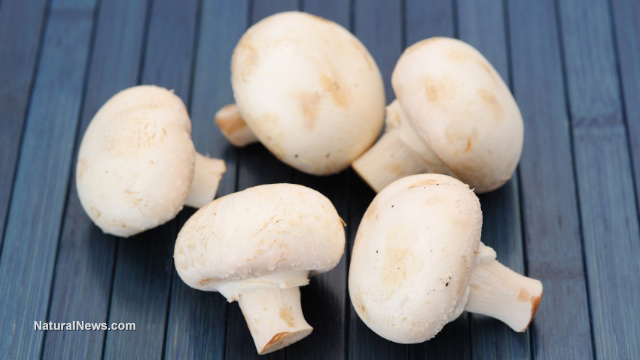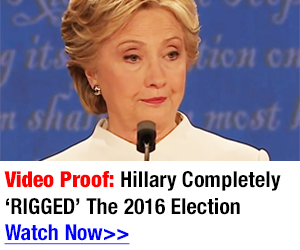This smart, harmless pesticide patent could take down Monsanto and change the world
Wednesday, November 02, 2016 by: J. D. Heyes
Tags: mushrooms, Monsanto, pesticides
Tags: mushrooms, Monsanto, pesticides
1,267SHARES

(NaturalNews) Is bio-agriculture giant Monsanto, king of genetically modified foods and seeds, about to suffer an irreversible decline while the planet Earth gets a huge chemical reprieve?
Well, it may be a bit too early to declare the St. Louis-based corporation dead in the water, but that day may soon be upon us, thanks to a nifty new pesticide patent that would make BioAg chemicals unnecessary.
As reported by the website Anonymous, one man who has dedicated his life to the study of mushrooms may have just stumbled upon the one invention that will dramatically change the way we protect food crops from voracious pests.
Paul Stamets has unearthed medical cure after cure, and he says the key to saving the planet can be found in the mushroom.
Stamets, one of the world's leading mycologists – if not the top researcher of fungi – filed a patent in 2001 that has since been all but ignored. Why? Because most of his research has been viewed as hostile to conventional industries, including the pesticide industry. Anonymous notes that some executives of the pesticide industry have remarked that the patent he filed was the most disruptive they had ever seen.
Kills pests naturally and with zero impact on the environment
And indeed, a read of the patent reveals a remarkable claim.
"The present invention relates to the use of fungal mycelium as a biopesticide. More particularly, the invention relates to the control and destruction of insects, including carpenter ants, fire ants, termites, flies, beetles, cockroaches and other pests, using fungal mycelia as both attractant and infectious agent," the patent says.
In other words, fungus that can be present on crops will both attract destructive pests and then infect and kill them after they have eaten it. In his patent, Stamets claims that more than one fungus can be used in combination, can be dried or freeze-dried, then packaged and reactivated for use "as an effective bioinsecticide."
No more chemicals. No more spraying. No more need for Monsanto's chemical-first approach to growing our food.
In his patent Stamets noted that the widespread use of chemical pesticides is a primary cause of a number of secondary environmental problems that occur besides the death of targeted pests. They include soil poisoning, the toxifying of underlying water tables and aquifers, as well as the pollution of surface water due to runoff.
In addition, they lead to increases in cancer, allergies, neurological diseases, immune disorders Even the deaths of some agricultural workers and consumers have been linked to the use of chemical pesticides.
Increasingly regulated and even banned in some countries, chemical pesticides like Monsanto's Roundup, with the cancer-causing primary ingredient glyphosate, have become so dangerous that many communities are scrambling for natural solutions to pest problems.
Who knew mushrooms could be so lethal to pests? This guy did
"Compounding these problems, many pest type or vermin insects have developed a broad spectrum of resistance to chemical pesticides, resulting in few commercially available pesticides that are effective without thorough and repeated applications," the patent says. "In addition to being largely ineffective and difficult and costly to apply, chemical pesticides present the further disadvantage of detrimental effects on non-target species, resulting in secondary pest outbreaks."
But his invention, he wrote, offers the agriculture industry an "environmentally benign" alternative to insect control by working to attract insects that latent preconidial mycelium that is fresh, dried or freeze-dried, that later infects and kills the host.
Infected insects will then carry the fungal hyphae back to the central colony, then disperse the fungal pathogen even further.
In essence, he wrote, fungal mycelium is both a bait/attractant as well as a food insecticide, and all without harming one thing in the environment.
It's a harmless pesticide that works without genetically modifying our food, poisoning our earth and filling humans with toxins. Using just mushrooms.
Now – who will step up and market it? You can bet it won't be Monsanto.
Sources:
AnonHQ.com
Google.com
Glyphosate.news
Well, it may be a bit too early to declare the St. Louis-based corporation dead in the water, but that day may soon be upon us, thanks to a nifty new pesticide patent that would make BioAg chemicals unnecessary.
As reported by the website Anonymous, one man who has dedicated his life to the study of mushrooms may have just stumbled upon the one invention that will dramatically change the way we protect food crops from voracious pests.
Paul Stamets has unearthed medical cure after cure, and he says the key to saving the planet can be found in the mushroom.
Stamets, one of the world's leading mycologists – if not the top researcher of fungi – filed a patent in 2001 that has since been all but ignored. Why? Because most of his research has been viewed as hostile to conventional industries, including the pesticide industry. Anonymous notes that some executives of the pesticide industry have remarked that the patent he filed was the most disruptive they had ever seen.
Kills pests naturally and with zero impact on the environment
And indeed, a read of the patent reveals a remarkable claim.
"The present invention relates to the use of fungal mycelium as a biopesticide. More particularly, the invention relates to the control and destruction of insects, including carpenter ants, fire ants, termites, flies, beetles, cockroaches and other pests, using fungal mycelia as both attractant and infectious agent," the patent says.
In other words, fungus that can be present on crops will both attract destructive pests and then infect and kill them after they have eaten it. In his patent, Stamets claims that more than one fungus can be used in combination, can be dried or freeze-dried, then packaged and reactivated for use "as an effective bioinsecticide."
No more chemicals. No more spraying. No more need for Monsanto's chemical-first approach to growing our food.
In his patent Stamets noted that the widespread use of chemical pesticides is a primary cause of a number of secondary environmental problems that occur besides the death of targeted pests. They include soil poisoning, the toxifying of underlying water tables and aquifers, as well as the pollution of surface water due to runoff.
In addition, they lead to increases in cancer, allergies, neurological diseases, immune disorders Even the deaths of some agricultural workers and consumers have been linked to the use of chemical pesticides.
Increasingly regulated and even banned in some countries, chemical pesticides like Monsanto's Roundup, with the cancer-causing primary ingredient glyphosate, have become so dangerous that many communities are scrambling for natural solutions to pest problems.
Who knew mushrooms could be so lethal to pests? This guy did
"Compounding these problems, many pest type or vermin insects have developed a broad spectrum of resistance to chemical pesticides, resulting in few commercially available pesticides that are effective without thorough and repeated applications," the patent says. "In addition to being largely ineffective and difficult and costly to apply, chemical pesticides present the further disadvantage of detrimental effects on non-target species, resulting in secondary pest outbreaks."
But his invention, he wrote, offers the agriculture industry an "environmentally benign" alternative to insect control by working to attract insects that latent preconidial mycelium that is fresh, dried or freeze-dried, that later infects and kills the host.
Infected insects will then carry the fungal hyphae back to the central colony, then disperse the fungal pathogen even further.
In essence, he wrote, fungal mycelium is both a bait/attractant as well as a food insecticide, and all without harming one thing in the environment.
It's a harmless pesticide that works without genetically modifying our food, poisoning our earth and filling humans with toxins. Using just mushrooms.
Now – who will step up and market it? You can bet it won't be Monsanto.
Sources:
AnonHQ.com
Google.com
Glyphosate.news
Learn more: http://www.naturalnews.com/055859_mushrooms_Monsanto_pesticides.html#ixzz4Ouv6dtvu


No comments:
Post a Comment